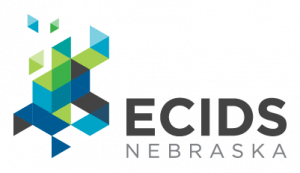Data Use
Data use is the process by which people examine and make sense of data to inform decisions and actions. In this process, stakeholders move from gaining knowledge to acting on that knowledge. The ECIDS demonstrates its value and achieves its purpose and vision when stakeholders use its data. Data use can inform stakeholders’ work, program effectiveness, and state and local policies. Identifying the data use priorities of the ECIDS early on can help establish clear, realistic expectations for how the system will be able to help meet instructional, programmatic, and policy goals.
One of the initial use cases for ECIDS in Nebraska is to establish a distinct or unduplicated count of children participating in programs/services throughout the state. Knowing how many distinct children are being served by one or more early childhood mixed delivery system (MDS) programs throughout the state is a foundational metric for most early childhood analyses to address short- and long-term practice, policy, and research-related use cases. Most key early childhood policy questions require the state to calculate an unduplicated count of children participating in programs/services in order to answer the intended policy or research question.
Many states struggle to access and use information about the status of early childhood services and programs to inform policy and practice. These data are often provided through a plethora of websites and program reports, and are rarely integrated across the agencies from which they originate. Compilation of disparate data provides context about the community needs, program availability, and collective impacts, improving responsiveness to the needs of young children and their families. The Preschool Development Grant (PDG) is supporting the creation of data analysis and visualization tool known as the Nebraska Early Childhood Data Explorer (the “EC Explorer”, for short) that allows Nebraska to use the EASI framework to; identify programs that match service needs (Eligibility), assess the location and characteristics of current service providers (Access), monitor the service status of children (Services), and compare current service landscape to available outcome metrics (Impact). The EC Explorer will be an interactive tool allowing users to easily access and compare comprehensive data in one place. The EC Explorer will provide useful, accurate, and timely data to the public related to early childhood programs and services in Nebraska. The current version represents a proof of concept of the technology to produce the visualizations and data tables. Many data on EC programs or services are missing or may be incomplete. Subsequent versions will add functionality and integrate additional data sources. We greatly appreciate your feedback as we work to improve the EC Explorer. Please use the Contact Us page to offer any suggestions or corrections.





